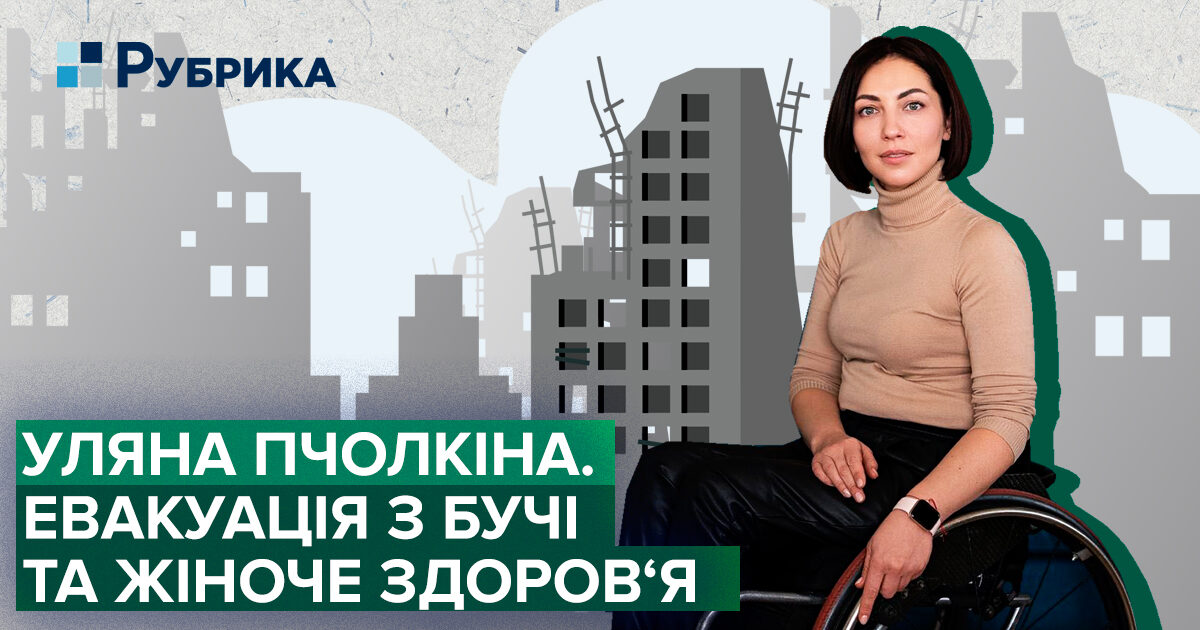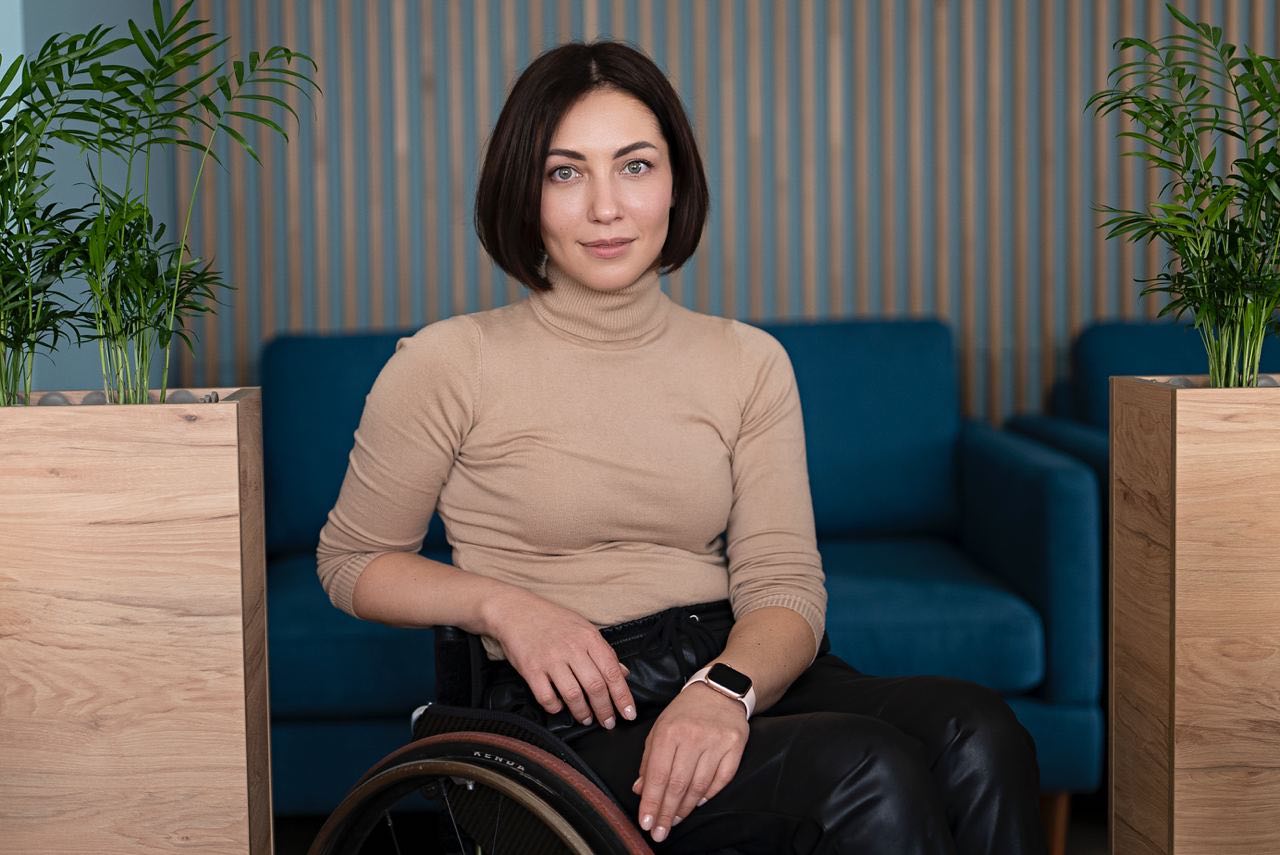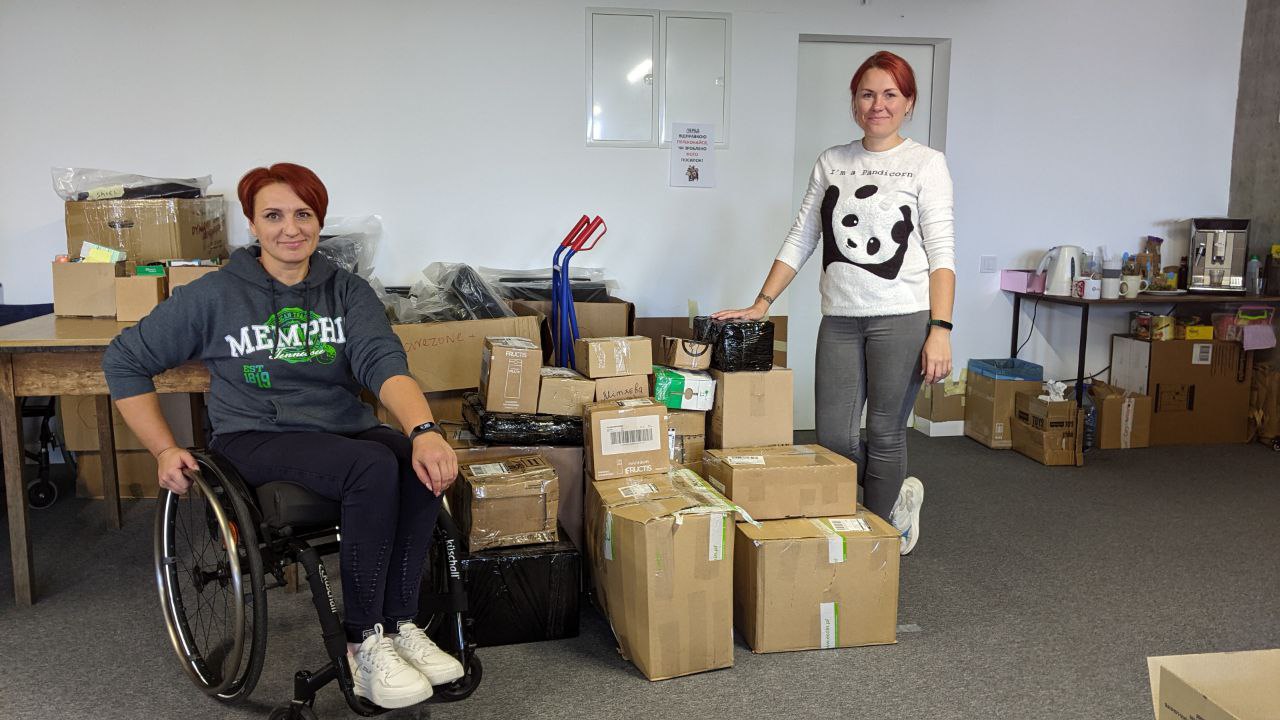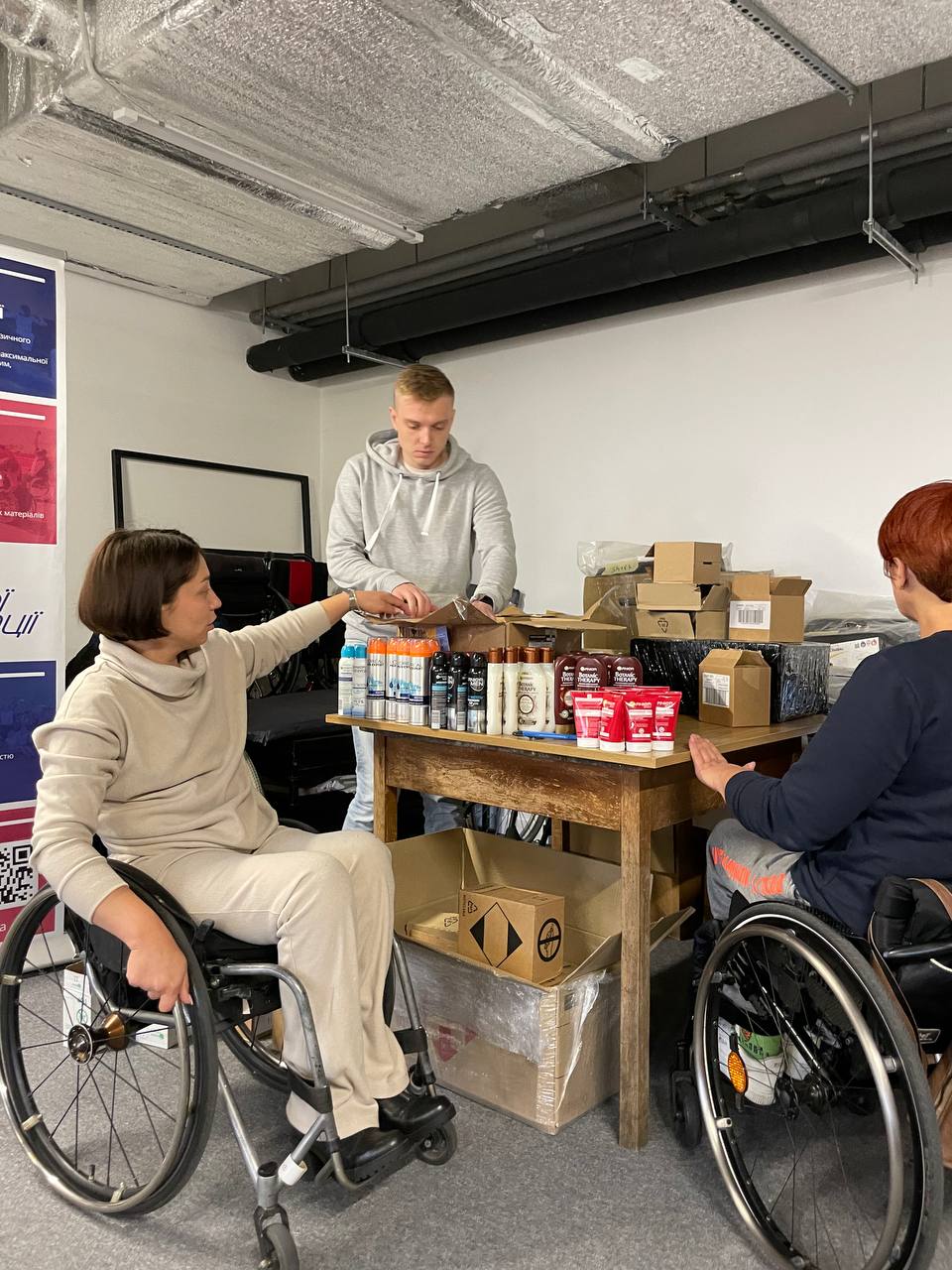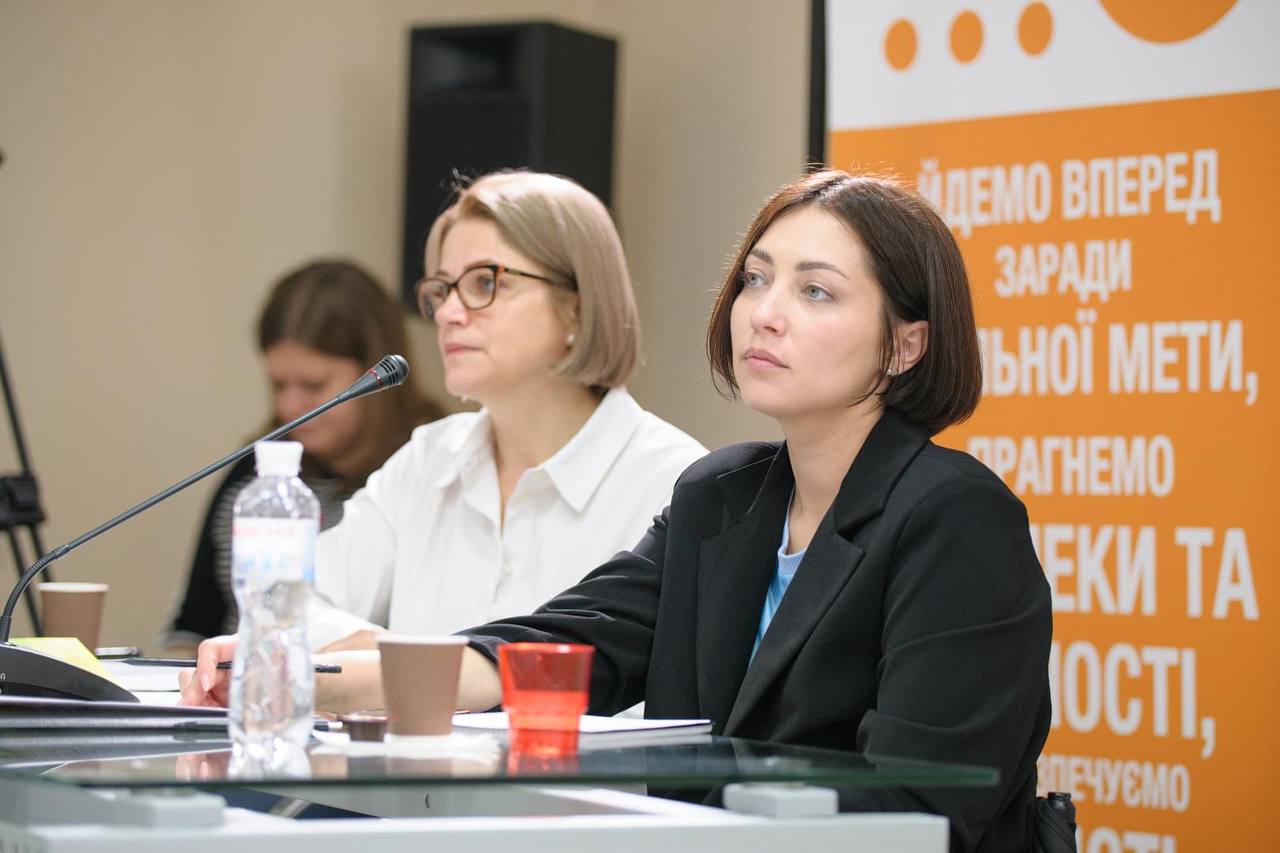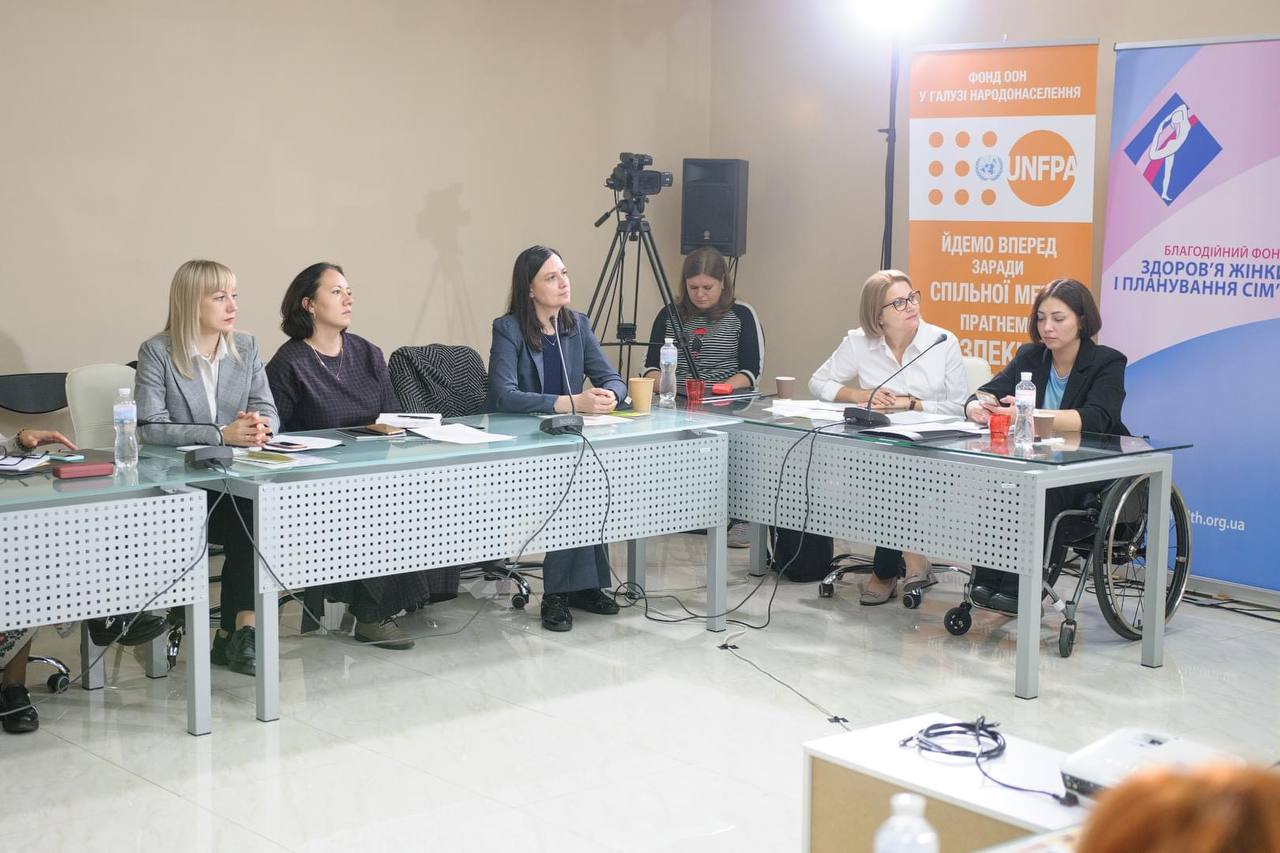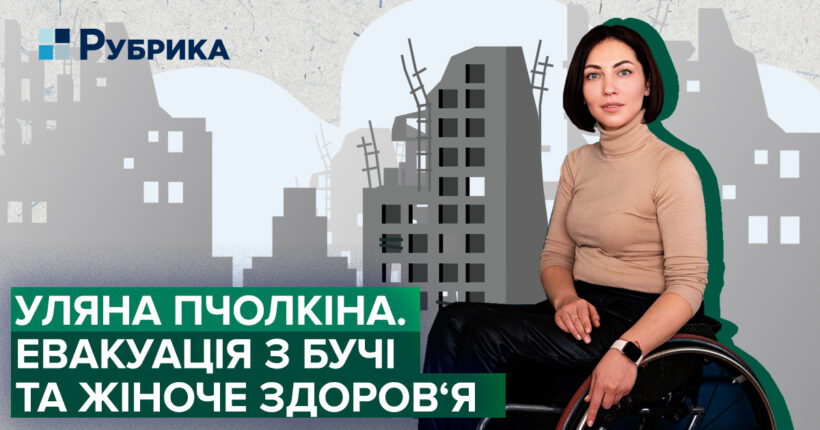
"It's air defense. Calm down," Uliana said with almost no emotion, dialing someone from her family to check if everything was okay with them.
We filmed the fourth and final issue of the Women's Health During War special project in Lviv on the day when russia once again carried out a criminal attack on Ukraine's critical infrastructure. You can hear the explosions even in our video. But could it have stopped us? The strength of our fourth heroine is much greater than the pitiful efforts of our enemy.
Uliana Pcholkina is a public figure, TV presenter, and world champion in para karate. Together with her husband, she helps people with disabilities through the organization, Active Rehabilitation Group.
The morning of February 24 divided the life of Uliana Pcholkina and her husband into "before" and "after"—like the lives of most Ukrainians. Before the full-scale invasion, the couple lived in Bucha. They set everything in their home to be as comfortable as possible for them. Uliana and her husband Vitalii are people with disabilities. For them, the war was not just a test. It literally put them in a position where they felt utterly helpless.
Переглянути цей допис в Instagram
In the new issue, you'll hear not only the story of the evacuation from Bucha. We will also discuss what kind of support women with disabilities need today and how to solve these issues.
"I was expecting an invasion. I did not expect genocide"
"I haven't been excluded from the context of the war since 2014. I have always been concerned about the issue of wounded soldiers, veterans, and their future paths. It doesn't matter why a person in a wheelchair was injured. Our needs will be the same—a barrier-free space, technical means, rehabilitation, and treatment. Excluding myself from this process, pretending that the war was somewhere out there, far away, was not possible for me. Therefore, I was expecting an invasion. I did not expect genocide, to be honest."
Переглянути цей допис в Instagram
Uliana recalls the final weeks before the full-scale invasion. She admitted that the constant involvement in the context of the war somehow cooled her down. Therefore, she did not pack the "emergency suitcase."
"I'm not saying it's right. No. In fact, it is a destructive action on my part. The only thing I did was inform people on my social media how to act in this or that case," says Uliana.
Even after hearing the appeals of the international community since the autumn and realizing that russia's style is "nomadic aggression" and terror, it was difficult to believe that the war would engulf the entire country.
"Some attack on one part [of Ukraine]—yes. But it was hard to believe that they would launch rockets at peaceful cities and shoot civilians with their hands tied behind their backs. Although I could believe it, but not accept it."
"Where can people with disabilities go?"
The Pcholkin family's house is located only 3 kilometers from the Hostomel airfield, which was invaded first by the russian forces in the Kyiv region. They saw how the first helicopters flew and heard explosions. But at the same time, they understood that they had nowhere to run.
"When it all started, we stayed in our apartment. Where to go? Where will it be possible for a person in a wheelchair to stay without electricity and water? Our apartment is adapted to such needs. That is why we did not dare to leave even when we were occupied. And horror in the city began to happen almost immediately."
Переглянути цей допис в Instagram
However, Uliana is convinced that in the fall of 2021, when it was already clear that a full-scale war was real, we wouldn't have made it in time to introduce measures.
"Even then, I started talking to the local authorities, asking, what will we do? Where can people with disabilities go? Since 2014, many people with disabilities have died in Donetsk and Luhansk regions. They could not evacuate due to the lack of warnings, evacuation plans, and available bomb shelters. We had all eight years from the beginning of russia's aggression to build shelters, bomb shelters, teach the civilian population how to act in the event of an attack."
This complex work should have been carried out long before a full-scale invasion. The issue of accessibility and barrier-free space was acute in the country even before the 2014 war. But now, it has become a matter of life and death.
"When a person in a wheelchair comes under fire on the street, it is impossible for them to fall and hide. Even if I fall, I just can't get up afterward. I have to look for help. Well, imagine these circumstances. I remember that the Kyiv City Administration reported that they had found a bomb shelter that a person in a wheelchair could access. So, let's go there and gather. Well, it's comic…"
It's scary when your friend texts you: "They came to us, help!"
Uliana and her husband were under occupation for almost two weeks. Thanks to the fact that another family was hiding in the apartment with them, they survived.
"We went out into the hall between the thick walls, and they were sitting under the stairs, having run from the fifth floor. We called them to us and were with them all this time. Actually, thanks to them, we survived. They could, at least, have gone to bring water for all of us. Because it's hard to drive in a wheelchair on the ammunition casings—we've discovered that."
The electricity went out almost immediately, then the gas and water supply were shut down. A fire broke out on the fourth floor of Uliana's building due to a missile impact. The families managed to extinguish it. And on March 4, when the Zaporizhzhia Nuclear Power Plant was occupied, Uliana was able to post the last story on her social media with the words, "Where are you looking, world? We are in danger of a nuclear explosion." After that, the connection completely disappeared.
"We were in a complete information blockade for five days. It's scary when a friend texts you: 'They came to us, help!' And there was no more contact with her until the 10th [of March] when they left. Compared to the occupied and de-occupied territories, these five days do not look so bad now. In fact, we still managed easily: we had food reserves and could collect technical water. The only thing was that it was freezing, and frosts were ahead."
They collected the courage to leave precisely because of the cold. Uliana says that a person in a wheelchair below the level of injury has impaired thermoregulation. If they freeze, it is challenging to warm up. Therefore, on March 9, they decided to leave.
"We left in convoy. I'm driving my car, and my husband is on our organization's bus. We were driving along a non-agreed corridor. We slipped through Dmytrivka and saw the bombed columns of the occupiers there. And I want to believe that the animal that was touching my passport, my car, burned up somewhere, in that pile of shit that was burning there."
They also drove through minefields and saw how one of the cars that broke out of the convoy was fired upon. "They came out of it untouched," adds Uliana. Only after eight in the evening did their group reach the shelter in Fastov. And after that, they decided to move to the West. They found housing in Lviv, where we met for the interview.
Переглянути цей допис в Instagram
Upon reaching Lviv, Uliana and her husband immediately got involved in volunteer work. The public organization, Active Rehabilitation Group, where the couple works, created the Humanitarian Hub. From the first days after leaving the occupation, volunteers packed, sent, and delivered parcels with necessary things for people with health and body function disorders.
Their humanitarian hub has grown significantly, and volunteers and donors have joined. It is planned to purchase many wheelchairs for people with spinal cord injuries and similar diseases. In the future, the organization plans to return to its usual activities.
"Now, the examination of a woman with a disability lasts 12 minutes"
Issues related to the reproductive health of women with a disability were acute even before the full-scale war. And now, when many of them have become migrants and refugees, it has become especially relevant.
"There is almost no access to the normal provision of reproductive sexual health for women in wheelchairs in Ukraine. No control, no preventive measures of any kind. Let's face it: it's not that easy for any woman, even one who doesn't have a disability, to climb into that chair. I say nothing about myself. In big cities, however, private medicine has made great strides in this matter. They are interested in patients, so they install the chairs with lifts and so on."
A round table dedicated to these issues was recently held in Kyiv. Uliana acted as a moderator and expert.
"Yes, I understand that it was a concentration of interested people. But there were not two of them, but much more. And they want to learn and develop. They are looking for terminology, methods, and patient communication peculiarities. After all, women with spinal cord injuries still have preserved intelligence. But if a person has mental disorders, it's a completely different matter. For example, a person with autism is taught that no one has the right to touch their private parts because this is violence. And immediately, it is necessary to explain that a gynecologist can do it. You understand, right? This is arduous work."
There are also problems with educational work, not only among women with disabilities.
"There are movements, but it does not cover mass requests. We also have big problems with education regarding women's health. We are no longer talking about women with disabilities in general. I can assess 'before' and 'after' because I received my disability in adulthood. We are used to going to the doctor when it is late or almost late. Therefore, I urge all women to take care of their health whenever possible, especially when they are a little over 30. Look for your gynecologist, and take care of yourself."
There are also accessibility issues: how can a woman in a wheelchair find out where there is a barrier-free office and how to get to it, in addition to finding a professional doctor and not going overboard with the standard medical care package?
"Now, in Ukraine, the examination of a woman with a disability takes the same 12 minutes as the examination of a woman without a disability, according to the service package. I can take off my pants in 12 minutes, but I cannot talk to a doctor and describe my problem. I know these questions will be forced because we need to go to the person, not the standards."
Uliana immediately followed the path of private clinics. But she emphasizes that it is impossible to judge all women with disabilities based on their situation.
"I work. I can pay. People who do not have opportunities are in a completely different situation. They do not have access to medical services. They can't even have regular contact with a family doctor. No availability. In rural areas, women do not go for examinations. How can they? How to get there?"
Uliana emphasizes that, of course, all reforms cannot work instantly. It takes time. And the first thing to do is to conduct information campaigns. Women should know their rights and understand that taking care of their health is vital.
"We will become realized in this matter when we convey this information not to me, Uliana from Kyiv, but to a woman in the most remote village of the Zakarpattia region. When this information comes to her, and she can get these services, we can say that we have really achieved something," says Uliana.
—
This was the fourth issue of a series of stories about women's health during the war.
We talked about mental and physical health. We heard the stories of different women and different fates. They were all united by the war. Each of us lives it in our own way. But all this only makes us stronger.
Take care of yourself, take care of your health, and enjoy yourself even in those conditions when it is difficult and—it would seem—inappropriate to be happy. We do not have the right to give away our lousy health to the enemy.

Giving birth under shelling: one woman's story of first days of war

How war stress affects women's health and how to protect it. Gynecologist advises

"Feeling abnormal is normal." Mental health of women during war or why it's great that women seek help
The project is carried out with the support of the Independent Regional Publishers of Ukraine Association as part of implementing the grant project The Women in News from WAN-IFRA. The authors' views do not necessarily coincide with the official position of the partners.
Newsletter
Digest of the most interesting news: just about the main thing




